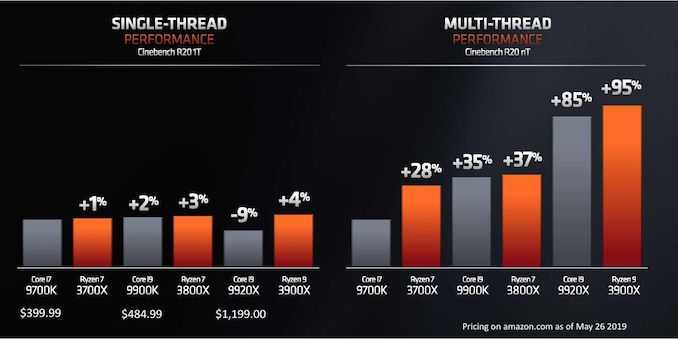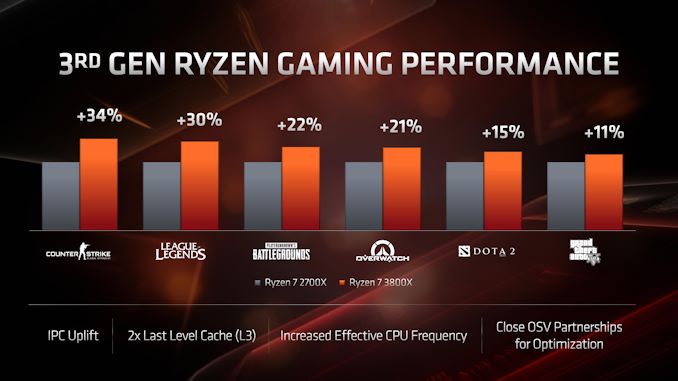AMD Zen 2 Microarchitecture Analysis: Ryzen 3000 and EPYC Rome
by Dr. Ian Cutress on June 10, 2019 7:22 PM EST- Posted in
- CPUs
- AMD
- Ryzen
- EPYC
- Infinity Fabric
- PCIe 4.0
- Zen 2
- Rome
- Ryzen 3000
- Ryzen 3rd Gen
Performance Claims of Zen 2
At Computex, AMD announced that it had designed Zen 2 to offer a direct +15% raw performance gain over its Zen+ platform when comparing two processors at the same frequency. At the same time, AMD also claims that at the same power, Zen 2 will offer greater than a >1.25x performance gain at the same power, or up to half power at the same performance. Combining this together, for select benchmarks, AMD is claiming a +75% performance per watt gain over its previous generation product, and a +45% performance per watt gain over its competition.
These are numbers we can’t verify at this point, as we do not have the products in hand, and when we do the embargo for benchmarking results will lift on July 7th. AMD did spend a good amount of time going through the new changes in the microarchitecture for Zen 2, as well as platform level changes, in order to show how the product has improved over the previous generation.
It should also be noted that at multiple times during AMD’s recent Tech Day, the company stated that they are not interested in going back-and-forth with its primary competition on incremental updates to try and beat one another, which might result in holding technology back. AMD is committed, according to its executives, to pushing the envelope of performance as much as it can every generation, regardless of the competition. Both CEO Dr. Lisa Su, and CTO Mark Papermaster, have said that they expected the timeline of the launch of their Zen 2 portfolio to intersect with a very competitive Intel 10nm product line. Despite this not being the case, the AMD executives stated they are still pushing ahead with their roadmap as planned.
| AMD 'Matisse' Ryzen 3000 Series CPUs | |||||||||||
| AnandTech | Cores Threads |
Base Freq |
Boost Freq |
L2 Cache |
L3 Cache |
PCIe 4.0 |
DDR4 | TDP | Price (SEP) |
||
| Ryzen 9 | 3950X | 16C | 32T | 3.5 | 4.7 | 8 MB | 64 MB | 16+4+4 | 3200 | 105W | $749 |
| Ryzen 9 | 3900X | 12C | 24T | 3.8 | 4.6 | 6 MB | 64 MB | 16+4+4 | 3200 | 105W | $499 |
| Ryzen 7 | 3800X | 8C | 16T | 3.9 | 4.5 | 4 MB | 32 MB | 16+4+4 | 3200 | 105W | $399 |
| Ryzen 7 | 3700X | 8C | 16T | 3.6 | 4.4 | 4 MB | 32 MB | 16+4+4 | 3200 | 65W | $329 |
| Ryzen 5 | 3600X | 6C | 12T | 3.8 | 4.4 | 3 MB | 32 MB | 16+4+4 | 3200 | 95W | $249 |
| Ryzen 5 | 3600 | 6C | 12T | 3.6 | 4.2 | 3 MB | 32 MB | 16+4+4 | 3200 | 65W | $199 |
AMD’s benchmark of choice, when showcasing the performance of its upcoming Matisse processors is Cinebench. Cinebench a floating point benchmark which the company has historically done very well on, and tends to probe the CPU FP performance as well as cache performance, although it ends up often not involving much of the memory subsystem.
Back at CES 2019 in January, AMD showed an un-named 8-core Zen 2 processor against Intel’s high-end 8-core processor, the i9-9900K, on Cinebench R15, where the systems scored about the same result, but with the AMD full system consuming around 1/3 or more less power. For Computex in May, AMD disclosed a lot of the eight and twelve-core details, along with how these chips compare in single and multi-threaded Cinebench R20 results.
AMD is stating that its new processors, when comparing across core counts, offer better single thread performance, better multi-thread performance, at a lower power and a much lower price point when it comes to CPU benchmarks.
When it comes to gaming, AMD is rather bullish on this front. At 1080p, comparing the Ryzen 7 2700X to the Ryzen 7 3800X, AMD is expecting anywhere from a +11% to a +34% increase in frame rates generation to generation.
When it comes to comparing gaming between AMD and Intel processors, AMD stuck to 1080p testing of popular titles, again comparing similar processors for core counts and pricing. In pretty much every comparison, it was a back and forth between the AMD product and the Intel product – AMD would win some, loses some, or draws in others. Here’s the $250 comparison as an example:
Performance in gaming in this case was designed to showcase the frequency and IPC improvements, rather than any benefits from PCIe 4.0. On the frequency side, AMD stated that despite the 7nm die shrink and higher resistivity of the pathways, they were able to extract a higher frequency out of the 7nm TSMC process compared to 14nm and 12nm from Global Foundries.
AMD also made commentary about the new L3 cache design, as it moves from 2 MB/core to 4 MB/core. Doubling the L3 cache, according to AMD, affords an additional +11% to +21% increase in performance at 1080p for gaming with a discrete GPU.
There are some new instructions on Zen 2 that would be able to assist in verifying these numbers.















216 Comments
View All Comments
wurizen - Friday, June 14, 2019 - link
flex^^^wurizen - Friday, June 14, 2019 - link
OMFG! I. Am. Not. Talking. About. Intel. Mesh.I. Am. Talking. About. Infinity. Fabric. High. Memory. Latency!
Now that I got that off my chest, let's proceed shall we...
OMFG!
L3 Cache? WTF!
Do you think you're so clever to talk about L3 cache to show off your knowledge as if to convince ppl here you know something? Nah, man!
WTF are you talking about L3 cache, dude? Come on, dude, get with the program.
The program is "Cross-CCX-High-Memory-Latency" with Infinity Fabric 1.0
And, games (BO3, BF1, BF4 from my testing) are what is affected by this high latency penalty in real-time. Imagine playing a game of BO3 while throughout the game, the game is "micro-pausing" "Micro-slow-motioning" repeatedly throughout the match? Yep, you got it, it makes it unplayeable.
In productive work like video editing, I would not see the high latency as an issue unless it affects "timeline editing" causing it to lag, as well.
I have heard some complain issues with it in audio editing with audio work. But I don't do that so I can't say.
As for "compute-intensive applications (y'know, real work)" --delatFx2
....
.....
......
You duh man, bruh! a real compute-intensive, man!
"This article mentions a Windows 10 patch to ensure that threads get assigned to the same CCX before going to the adjacent one." --deltaFx2
Uhhh... that won't fix it. Only AMD can fix it in Infinity Fabric 2.0 (Ryzen 2), if, indeed, AMD has fixed it. By making it faster! And/or, reducing that ~110ns latency to around 69ns.
Now, my question is, and you (deltaFx2) hasn't mentioned it in your wise-response to my comments is that SLIDE of "Raw Memory Performance" showing 69ns latency at 3200 Mhz RAM. Is that Raw memory performance Intra-CCX-Memory-Performance or Inter-core-Memory-Performance? Bada-boom, bish!
wurizen - Friday, June 14, 2019 - link
it's a problem ppl are having, if you search enough....Alistair - Wednesday, June 12, 2019 - link
those kinds of micro stutters are usually motherboard or most likely your windows installation causing it, reinstall windows, then try a different motherboard maybewurizen - Wednesday, June 12, 2019 - link
Wow, really? Re-install windows?I just wanna know (cough, cough Anand) what the Cross-CCX-Latency is for Ryzen 2 and Infinity Fabric 2.0.
If, it is still ~110ns like before.... well, guess what? 110 nano-effin-seconds is not fast enough. It's too HIGH a latency!
You can't update bios/motherboard or re-install windows, or get 6000 Mhz RAM (the price for that, tjo?) to fix it. (As shown in the graph for whatever "Raw Memory Latency" is for that 3200 Mhz RAM to 3600 Mhz stays at 69 ns and only at 37333 Mhz RAM does it drop to 67ns?).... This is the same result PCPER did with Ryzen IF 1.0 showing that getting Faster RAM at 3200 Mhz did not improve the Cross-CCX-Memory-Latency....
supdawgwtfd - Thursday, June 13, 2019 - link
O don't get any stutters with my 1600.As above. It's nothing to do with the CPU directly.
Something else is causing the problem.
deltaFx2 - Thursday, June 13, 2019 - link
How so you know for sure that the microstutter or whatever it is you think you are facing is due to the inter-ccx latency? Did you actually pin threads to CCXs to confirm this theory? Do you know when inter-ccx latency even comes into play? Inter-ccx latency ONLY matters for shared memory being modified by different threads; this should be a tiny fraction of your execution time, otherwise you are not much better going multithreaded. Moreover, Each CCX runs 8 threads so are you saying your game uses more than 8? That would be an interesting game indeed, given that intel's mainstream gaming CPUs don't have a problem on 4c8t.To me, you've just jumped the the gun and gone from "I have got some microstutter issues" to "I know PCPer ran some microbenchmark to find out the latency" to "that must be the problem". It does not follow.
FreckledTrout - Thursday, June 13, 2019 - link
I agree. If micro stutter from CCX latency was really occurring this would be a huge issue. These issues really have to be something unrelated.wurizen - Friday, June 14, 2019 - link
Another thing that was weird was GPU usage drop from 98% to like 0% in-game, midst-action, while I was playing... constantly, in a repeated pattern throughout the game... this is not a server or games hitching. we understand as gamers that a game will "hitch" once in a while. this is like "slow-motion" "micro-pause" thing happening through out the game. happens in single player (BF1) so I ruled out server-side. It's like the game goes in "slow-motion" for a second... not once or twice in a match, per se. But, throughout and in a repeated constant fashion... along with seeing GPU usage to accompany the effect dropping from 98% or so (normal) to 0% for split seconds (again, not once or twice in a match; but a constant, repeated pattern throughout the match)And, there are people having head-scratching issues similar to me with Ryzen CPU.
No one (cough, cough Anand; nor youtube tech tubers will address it) seems to address it tho.
But, I think that Ryzen 2 is coming out and if Cross-CCX-High-LAtency-Issue is the same, then we're bound to hear more. I'm sure.
I am thinking tech sites are giving AMD a chance... but not sure... doesn't matter tho. I got a 7700k (I wanted the 8-core thing when 1700x Ryzen came out) but its fine. Im not a fanboy. Just a techboy.... if anything...
wurizen - Friday, June 14, 2019 - link
The "micro-stutter" or "micro-pausing" is not once or twice (I get those with Intel, as well) but, a repeated, constant pattern throughout the match and round of game. The "micro-stutter" and "micro-pause" also "FEELS" different than what I felt with my prior 3700K CPU and current 7700K CPU. It's like a "micro-slow-motion." I am not making this up. I am not crazy!